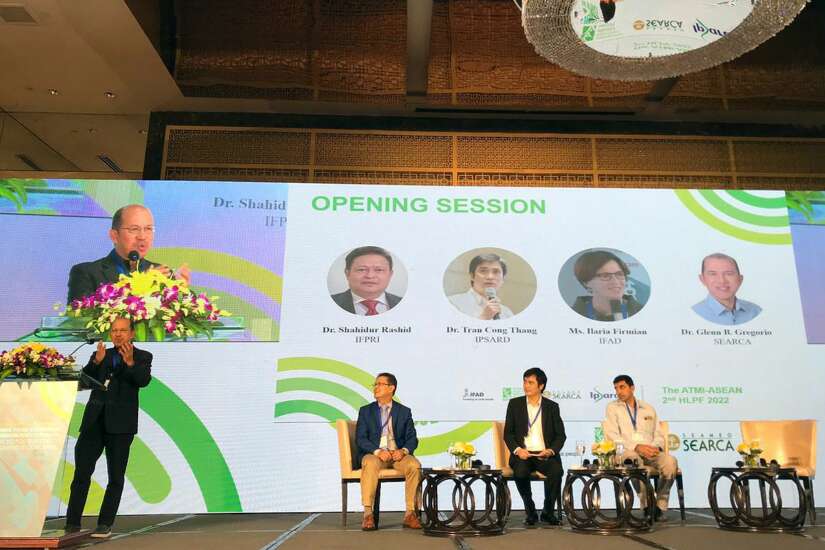Analysts, policymakers, researchers, international donors, and public-private entities convened in a high-level policy forum today in Hanoi, Vietnam to deliberate on five years of rigorous research in “Agricultural Transformation and Market Integration in the ASEAN Region: Responding to Food Security and Inclusiveness Concerns (ATMI-ASEAN).”
ATMI-ASEAN is a program covering the Philippines, Cambodia, Lao PDR, Myanmar, and Vietnam that is jointly implemented by the International Food Policy Research Institute (IFPRI) and the Los Baños-based Southeast Asian Regional Center for Graduate Study and Research in Agriculture (SEARCA). It is funded by the International Fund for Agricultural Development (IFAD).
More than 100 stakeholders participated in the forum co-organized by IFPRI, SEARCA, and Vietnam’s Institute of Policy and Strategy for Agriculture and Rural Development (IPSARD). They included representatives from the Ministry of Agriculture and Rural Development, Government of Vietnam; Ministry of Agriculture, Forestry, and Fisheries (MAFF), Cambodia; Ministry of Agriculture, Livestock, and Irrigation (MoALI) Myanmar; Asian farmer organizations, research institutions, donors, civil society, NGOs, and academics.
Themed “Transforming Food Systems in the ASEAN Region Post COVID-19,” the forum took stock of the progress surrounding food security and inclusivity in the ASEAN region. The participants deliberated on ways forward for a resilient recovery of agri-food value chains that will ensure the inclusiveness of smallholders in the regional and global value chains and make them resilient to shocks.
Unless food security and smallholder inclusiveness are credibly harmonized with ASEAN’s competitiveness agenda, improvements in regional agricultural and food markets will be inadequate, leaving them vulnerable to sudden disruptions, the forum organizers stressed.
The forum also showcased ATMI-ASEAN program outputs, among which are SEARCA-led components, namely, the regional value chain assessment conducted in coordination with the Association of Southeast Asian Nations (ASEAN) Secretariat, as well as the national-level agricultural value chain studies, policy strategies, and national roadmaps for value chains within the five target ASEAN member states (AMS).
“The roadmaps will further help to strengthen the capacity of the targeted AMS in developing policies and programs to support the adjustment of the smallholder farm sector to changes in sub-regional and supra-regional agricultural and food markets,” said SEARCA Director Dr. Glenn B. Gregorio.
The participants also discussed possible ways to sustaining the use of the program’s work beyond its lifecycle through an extended network of policy actors and analysts. ATMI-ASEAN internalizes the reshaping of the food system with the public health concerns and the geopolitical complex.
We are proud that our support has contributed to better coordination of food security policies and the development of regional and sub-regional roadmaps for investments in food and agri-based value chains for the ASEAN region,” said Mr. Abdelkarim Sma, IFAD Lead Regional Economist.
“I am particularly happy that the capacity-building efforts of the programme have helped strengthen national government agencies and ASEAN in their respective planning and programming capacities,” Sma said.
About SEARCA
Since its establishment in 1966, the main mandate of the Southeast Asian Regional Center for Graduate Study and Research in Agriculture (SEARCA) has been to build capacities in agricultural and rural development in Southeast Asia. From 2020 to 2025, SEARCA’s core programmes on Education and Collective Learning, Research and Thought Leadership, and Emerging Innovation for Growth are geared towards accelerating transformation through agricultural innovation (ATTAIN) to elevate the quality of life of agricultural families through sustainable livelihoods and access to modern networks and innovative markets. SEARCA is hosted by the Philippine government in Los Baños, Laguna. www.searca.org
About the ATMI-ASEAN Project
The Agricultural Transformation and Market Integration in ASEAN Region: Responding to Food Security and inclusiveness Concerns (ATMI-ASEAN) project was launched in June 2016. The leading project implementer is the International Food Policy Research Institute (IFPRI) in collaboration with the co-implementer, the Southeast Asian Regional Center for Graduate Study and Research in Agriculture (SEARCA) and supported by International Fund for Agricultural Development (IFAD). The ATMI programme targets five ASEAN Member States—Cambodia, Lao PDR, Myanmar, Viet Nam, and the Philippines—and ASEAN in general. https://www.ifpri.org/project/agricultural-transformation-and-market-integration-asean-region-responding-food-security-and
About IPSARD
Institute of Policy and Strategy for Agriculture and Rural Development (IPSARD) is public science and technology institution under the Ministry of Agriculture and Rural Development (MARD), established in September 2009. As a think tank of MARD, IPSARD is in charge of scientific research, technology transfer, international cooperation, policy advice, baseline surveys, information, training, and services in the field of agriculture and rural development. https://ipsard.gov.vn
About IFAD
The International Fund for Agricultural Development (IFAD) invests in rural people, empowering them to reduce poverty, increase food security, improve nutrition and strengthen resilience. Since 1978, we have provided US$23.2 billion in grants and low-interest loans to projects that have reached an estimated 518 million people. IFAD is an international financial institution and a United Nations specialized agency based in Rome – the United Nations food and agriculture hub. www.ifad.org
About IFPRI
The International Food Policy Research Institute (IFPRI) seeks sustainable solutions for ending hunger and poverty. IFPRI was established in 1975 to identify and analyze alternative national and international strategies and policies for meeting the food needs of the developing world, with particular emphasis on low-income countries and the poorer groups in those countries. Visit: www.ifpri.org

